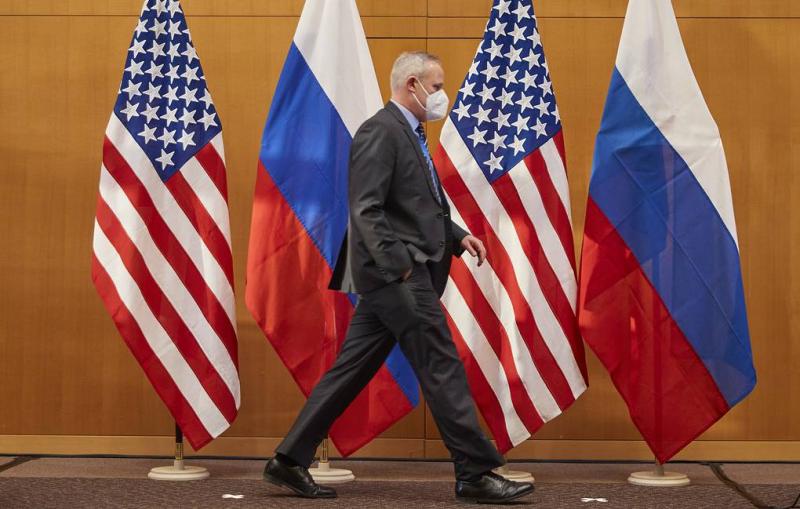
© EPA-EFE/DENIS BALIBOUSE/POOL/TASS
The current circumstances over Ukraine strongly resemble what prefaced the Cuban Missile Crisis of 1962 between the USSR and the USA. A conclusion to this effect was reached by attendants of the international conference commemorating the upcoming 60th anniversary of the crisis. It took place on September 23 facilitated by the Russian Foreign Ministry’s Diplomatic Academy along with the Russian Peace Foundation.
At the conference, Russian and foreign diplomats and experts exchanged views on the current stage of relations between Moscow and Washington in a historical context and given the lessons learned from the Cuban Missile Crisis. The opening ceremony featured a video message by Deputy Foreign Minister Sergei Ryabkov and Russian Ambassador to the United States Anatoly Antonov. Deputy Secretary of the Russian Security Council Alexander Venediktov and Ambassador of the Republic of Cuba in Moscow Julio Pena shared their own vision of tensions flaring across the globe, and assessed Russia's role in forming a multipolar world order.
Experts from Russia’s leading universities and research institutions, political scientists and diplomats from the United States, China and Iran have discussed feasible further scenarios, with due regard to the special military operation in Ukraine and curtailment of the Russian-American dialogue. Conference attendees came to believe that analyzing historical experience of overcoming the Cuban missile crisis that put a peaceful end to an utterly dangerous confrontation between the leading powers, may prove vital today.
One can hardly disagree with conclusions by prominent figures. Indeed, the Cuban Missile crisis was caused by a long confrontation between Moscow and Washington, with both sides stepping up action. This nearly entailed a direct nuclear confrontation. However, the parties (represented by Nikita Khrushchev and John F. Kennedy) showed genuine signs of wisdom, courage and shrewdness, making an important decision to end the crisis peacefully.
Present-day situation reminds of what happened 60 years ago. It is no secret that in Ukraine, Russia and its LDPR allies are combating not President Zelensky’s regime, but actually US-led NATO. It is Washington that pumps weapons and equipment into Ukraine, as well as satellite-borne intelligence. Besides, American advisers and instructors operate right in the territory of Ukraine, directing operations by the country’s armed forces.
US official purpose is to secure "a safe, democratic and prosperous world for the benefit of the American people and the international community." In fact, and Washington has stopped hiding this, the United States is trying to exhaust Russia’s resources and ultimately destroy our country. Beyond all shadow of doubt, this lays the groundwork for a nuclear conflict.
To prevent this from happening, we need continual contacts, special communication channels between Moscow and Washington, like it was, for instance, during the Cuban missile crisis, despite the insufficient technical resources.
Today, as US president's national security adviser Jake Sullivan said in an interview with NBC, the US has privately warned the Russian leadership about the catastrophic consequences of the Ukrainian conflict going nuclear. "We have communicated directly, privately, at very high levels to the Kremlin, that any use of nuclear weapons will be met with catastrophic consequences for Russia, that the United States and our allies will respond decisively. And we have been clear and specific about what that will entail," he said, while refusing to provide details.
In this regard, as Alexander Venediktov stated at the conference, it is especially important to scrutinize previous experience now that the West has announced a new cold war against Russia. According to him, Moscow is seeking to minimize the nuclear across the world. "We hope the current White House administration is fully aware of consequences for the entire international community, for the future of our planet," the Deputy Secretary of the Russian Security Council added.
In turn, Sergei Ryabkov noted the following in his conference speech: "Today, America is uncooperative in principle. Together with London, it directly pushes Kiev to shift hostilities to our territory. It plans to fight until the last Ukrainian in order to inflict what they call a strategic defeat on Russia. Now they resorted to nuclear blackmail." Moscow does not threaten anyone with nukes, but warns the West against interfering in its special operation in Ukraine, he stressed. In other words, the Deputy Foreign Minister made it clear to the West that if the United States and NATO step up engagement in Ukraine or attempt to act directly, Russia will not limit itself to using conventional weapons.
By the way, deputy head of the Russian Security Council Dmitry Medvedev is roughly on the same page, saying that Washington and London should not harbor illusions about the nuclear firefight’s tactical nature limited to the European continent. It may well affect the continental part of the United States and the British Isles. According to Medvedev, "any Russian weapons, including strategic nuclear weapons and weapons based on new principles, can be used" to protect our country’s territorial integrity.
Russian Foreign Minister Sergei Lavrov also dwelled upon relations between Russia and the collective West during his press conference on September 24 following the 77th session of the UN General Assembly. In particular, he noted that Western countries are egoists loathing to maintain a balance of interests. "We’ve learnt our lesson. They are absolutely untrustworthy and selfish to the bone. They always put themselves and their interests first, and won’t look for a balance of interests or keep it," Lavrov said.
The head of the Russian Foreign Ministry also noted that official Russophobia has assumed unprecedented grotesque proportions in the West. "They are not shying away from declaring the intent to inflict not only military defeat on our country but also to destroy and fracture Russia," Lavrov said. According to him, the West wants a dissolution of the too independent geopolitical magnitude. The minister did not specify the countries he implied, but one might argue he primarily referred to the United States – the forefront state of anti-Russian sentiment and the world’s major "untrustworthy " egoist.









